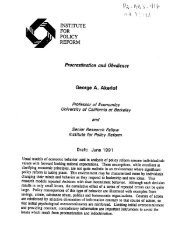African Trade and Investment Policy Program for Mali
African Trade and Investment Policy Program for Mali
African Trade and Investment Policy Program for Mali
You also want an ePaper? Increase the reach of your titles
YUMPU automatically turns print PDFs into web optimized ePapers that Google loves.
products to see their technical <strong>and</strong> production capacities, <strong>and</strong> then developing production<br />
samples of a range of home furnishings <strong>and</strong> leisure wear garments. AIRD economist Lynn<br />
Salinger <strong>and</strong> product development consultant Patti Carpenter surveyed production capabilities in<br />
small-to-medium scale textile <strong>and</strong> leather firms in December 2000 <strong>and</strong> conducted a workshop<br />
attended by twenty-five artisans, manufacturers, <strong>and</strong> exporters of textiles- <strong>and</strong> leather-based<br />
products. The workshop covered product design, color, manufacturing, quality, <strong>and</strong> export<br />
logistics issues.<br />
Carpenter returned to <strong>Mali</strong> in May/June 2001 to design five groups of product, samples of which<br />
were to be shown at the August 2001 New York International Gift Fair. She worked with <strong>Mali</strong>’s<br />
premier bogolan production studio in Ségou (Kaso Bané), as well as two fabric dyeing houses,<br />
several independent leather-tooling studios, <strong>and</strong> two sewn-product producers (one <strong>for</strong>mal, Palais<br />
de Vêtements, <strong>and</strong> one in<strong>for</strong>mal) in Bamako. The new <strong>Mali</strong>an products were well received at the<br />
Gift Fair. The leather boxes sold particularly well (<strong>for</strong> which orders totaled $1870, FOB <strong>Mali</strong>), as<br />
did some table top groupings <strong>and</strong> the indigo leisure wear robe (<strong>for</strong> which orders totaled $800,<br />
FOB <strong>Mali</strong>). This is an unprecedented accomplishment <strong>for</strong> <strong>Mali</strong>’s textile <strong>and</strong> leather artisans. A<br />
return trip by Carpenter to <strong>Mali</strong> in November 2001 was funded by several private U.S.<br />
wholesalers in order to ensure efficient fulfillment of orders. <strong>Mali</strong>an products developed through<br />
this activity will be shown at the January 2002 New York Gift Fair under the auspices of several<br />
private wholesalers.<br />
The most serious textile/leather sector development issues, highlighted at a final workshop with<br />
the Ministry <strong>and</strong> the private sector in Bamako in December 2001, include:<br />
• the limited production capacity of small-scale <strong>Mali</strong>an producers,<br />
• lack of consistent quality st<strong>and</strong>ards,<br />
• industrial technology <strong>and</strong> capital constraints,<br />
• unrealistic export pricing by producers,<br />
• lack of experienced export agents in <strong>Mali</strong> who are trained in the sourcing <strong>and</strong> supervision of<br />
high-end product manufacture,<br />
• the need <strong>for</strong> enhanced visibility of <strong>Mali</strong> <strong>and</strong> its textile sector vis-à-vis potential U.S. clients,<br />
<strong>and</strong><br />
• the lack of a private-public sector strategy in <strong>Mali</strong> <strong>for</strong> addressing the country-of-origin visa<br />
requirements of the <strong>African</strong> Growth <strong>and</strong> Opportunity Act.<br />
Implementation of a longer term coaching model <strong>for</strong> addressing these constraints should include<br />
work<strong>for</strong>ce training <strong>and</strong> marketing assistance. Longer term training needs <strong>for</strong> improving <strong>Mali</strong>ans’<br />
technical capacities <strong>and</strong> developing an emergent level of commercial networks include technical<br />
training in fabric <strong>and</strong> leather dyeing, leather tanning, fine sewing <strong>and</strong> tailoring, <strong>and</strong> product<br />
development; management training; professional association development; <strong>and</strong> training in<br />
marketing, export, <strong>and</strong> trade finance.<br />
Wheat Milling Industry<br />
The Gr<strong>and</strong>s Moulins du <strong>Mali</strong> (GMM) has enjoyed quasi monopoly power in wheat milling,<br />
thanks to the government’s policies. Duties <strong>and</strong> taxes on imported wheat flour totaled nearly<br />
80% until 1996. In addition to these duties <strong>and</strong> taxes, the GMM was granted a subsidy of nearly<br />
4.5 billion CFA francs between 1996 <strong>and</strong> 1998 to enable it to sell its milled wheat flour at an<br />
af<strong>for</strong>dable price to <strong>Mali</strong>an consumers, following the steep rise in the price of imported wheat<br />
6

















